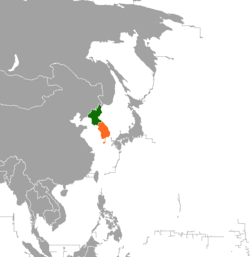Inter-Korean relations
 |
|
|
North Korea |
South Korea |
|---|---|
North Korea–South Korea relations (Hangul: 남북관계; Hanja: 南北關係; MR: Nambukkwan'gye) are the political, commercial, diplomatic, and military interactions between North Korea and South Korea. These interactions extend from the division of Korea in 1945 following World War II to today. The 1950–1953 Korean War and the subsequent Korean conflict are major factors impacting the efforts to achieve peace and Korean reunification.
According to a 2014 BBC World Service Poll, 3% of South Koreans view North Korea's influence positively, with 91% expressing a negative view, making South Korea, after Japan, the country with the most negative feelings of North Korea in the world. However, a 2014 government-funded survey found only 13% of South Koreans viewed North Korea as hostile, and 58% of South Koreans believed North Korea was a country they should cooperate with.
Leaders of the two states
The Korean peninsula had been occupied by Japan from 1910. On August 9, 1945, in the closing days of World War Two, the Soviet Union declared war on Japan and advanced into Korea. Though the Soviet declaration of war had been agreed by the Allies at the Yalta Conference, the US government became concerned at the prospect of all of Korea falling under Soviet control. The US government therefore requested Soviet forces halt their advance at the 38th parallel north, leaving the south of the peninsula, including the capital, Seoul, to be occupied by the US. This was incorporated into General Order No. 1 to Japanese forces after the Surrender of Japan on August 15. On August 24, the Red Army entered Pyongyang and established a military government over Korea north of the parallel. American forces landed in the south on September 8 and established the United States Army Military Government in Korea.
...
Wikipedia
